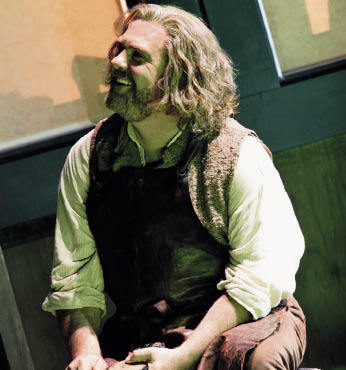Die Meistersinger
Welsh National Opera, Cardiff and touring
Welsh National Opera’s new staging of Die Meistersinger von Nürnberg is a triumph. Not an unqualified one — I doubt whether there has ever been such a thing — but enough to leave the audience feeling that mixture of glowing wellbeing and sadness that this work alone engenders. WNO has a distinguished history of Wagner productions, thanks above all to the close relationship which it had with Reginald Goodall in the late 1970s and early 1980s, and which resulted in the most inspired performances of Tristan und Isolde that I have ever attended. By then Goodall had had his say with his great, enormous accounts of The Mastersingers with ENO a decade before, and the Welsh company moved on with him to Parsifal. So this is the first Welsh Meistersinger and takes its place in that exalted company.
When you enter the theatre for this production you see a front cloth with the faces of many German or German-speaking figures of note: the director Richard Jones refers to them as artists, but that seems an odd way to describe Hegel or Max Weber. The point seems to be inclusivity, to use a word I loathe, but one which signifies the opposite of what Meistersinger is often taken to stand for. Gazing at and trying to identify as many of them as possible leads pleasantly into the lowering of lights and the Overture, which on the second night was one of the few areas of discontent of the evening. Slack rhythms, undernourished strings, made it lack both the excitement and the tenderness needed to set the scene.
But as soon as the curtain rose, to a demure congregation in a bare church about a century ago, things improved and went on improving. Act I, with the apprentice David’s preening presentation of the Masters’ rules, and then the long, painfully accurate depiction of a committee meeting, can seem indulgently detailed. But the conductor, Lothar Koenigs, the new music director of WNO, adroitly moved things on to a chamber-musical level, and the marvellous wit and charm of Wagner’s cornucopian score were enchantingly revealed — or, rather, absorbed. Furtwängler, writing about a performance of Meistersinger he attended in 1912, stated that ‘the impression was of a conversation piece; all the verbal points were made as clearly as in a spoken play. One was not conscious of the fact that there was music going on, yet the performance took place in so musical an atmosphere that the total effect was tremendous.’ That was just what happened in Cardiff, in Act I, and the David of Andrew Tortise and Brindley’s Sherratt’s superb Pogner were perhaps most to be thanked that it went so wonderfully.
Act II, by contrast, was a distinct disappointment. Despite Christopher Purves’s magnificent Beckmesser, not guyed at all, but a model of self-importance and unease, and extremely well sung, the magic of Midsummer Eve (we were hearing the music almost at the right time on the exact day) failed to descend. Initial impressions of Bryn Terfel’s Sachs were that it was just too relaxed, too much the cobbler and little of the poet; and the great and should-be alarming riot scene hung fire, the chorus too eager to follow the beat to let rip at the music and one another.
But magic returned from the opening moments of Act III, and the greatness of the performance was sealed. Sachs’s workroom, with electric lighting and moderately modern furniture, provided the setting for Bryn Terfel to explore fully this complex character, and he gave as complete an account of it as I have ever heard. It’s a role that suits him, vocally and temperamentally, far better than Wotan, and he still had plenty of power left for his final address, delivered with stirring conviction. When Sachs is portrayed as perfectly as this, he needs only reasonably good partners, and that is what he got from the Walther of Raymond Very, an itinerant singer whose name might have been Rodolfo, and from Amanda Roocroft’s Eva, extraordinarily girlish in appearance, but vocally stretched, if sometimes to thrilling effect. Very only just made it through the Prize Song; one shared the anxieties of his well-wishers on stage. The chorus is stupendous, and ‘Wach’ auf’ had almost Furtwänglerian intensity and grandeur. But it was above all the combination of Terfel’s depth of understanding of his role, and the penetrating conducting of Koenigs, which sealed this as one of the great Meistersinger performances I have ever been to, renewing my awe and gratitude at the incredible generosity and inventiveness of Wagner in what, for the time being at least, I can only regard as the greatest of his works.






Comments